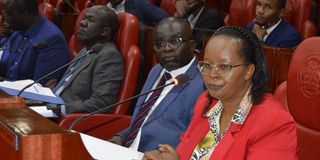KRA still in charge of revenue collection at City Hall after Deed of transfer expiry

KRA Commissioners Anastasia Githuba and Sylvestor Okello when they appeared before the Nairobi City County Assembly Ad Hoc Committee led by Majority Leader Peter Imwatok on December 15, 2023.
What you need to know:
- Mr Hannington Ogare, the Chief Manager Finance at KRA, said City Hall's revenue is collected into two bank accounts opened by KRA.
- KRA said the revenue collected in the two bank accounts is later transferred to the County Revenue Fund (CRF).
The Kenya Revenue Authority (KRA) is still in charge of revenue collection at the Nairobi City County government despite the expiration of the deed of transfer that saw the exit of the Nairobi Metropolitan Service (NMS) in August 2022, an ongoing probe by the Nairobi City County Assembly has revealed.
According to submissions to an ad hoc committee investigating the matter, the tax authority still controls two revenue collection accounts and a Paybill opened in 2020. The accounts are held at Cooperative Bank and Equity Bank in the name of the Nairobi City County government.
Mr Hannington Ogare, the Chief Manager Finance at KRA, said that City Hall's revenue is collected into the two bank accounts opened by KRA.
The bank accounts are also integrated with the Nairobi Revenue System (NRS), which the county government says it has no control over and is controlled by a mysterious individual identified only as Benson Njoroge.
Njoroge does not work for either the county or national government.
In its response, the KRA said the revenue collected in the two bank accounts is later transferred to the County Revenue Fund (CRF).
During the committee hearing, Anastasia Githuba, who serves as deputy commissioner for revenue at KRA, said she and a nine-member team from the revenue authority had been deployed by KRA to City Hall to assist in the transition process.
“At the end of the deed of transfer, I was redeployed to KRA to do the monthly rental income and domestic services. I did that from September to December until I received a request from the county governor to come and help with the transition process,” she told the committee.
Committee Chairperson Peter Imwatok asked CEC Finance Charles Kerich why they had allowed KRA to be in charge of revenue collection without following the law by entering into a new agreement.
In response, Kerich said only a handful of KRA officials were deployed by the governor to help in the transition process.
“The governor requested for a small team to remain behind for the transition purposes because when KRA was doing the revenue collection, they were in charge and had all the records. It was felt that if they left, they would leave a lot of issues not properly handled hence the decision that they were retained,” he said.
However, he did not answer whether there was a new formal agreement for KRA officials to continue providing the service, apart from the letter of request from Nairobi Governor Johnson Sakaja.
The committee also heard that the NRS currently used by the devolved unit is housed in the Ministry of ICT at the national government level. However, they do not know where the system's servers are located or who provides administrative access.
A total of nine KRA officials handling the revenue system under the devolved unit also report to Kerich.
Githuba claimed that the nine KRA officers are also currently operating from a rented office at the Kenya International Convention Centre (KICC), paid for by the county government through the Finance department.
However, the county's Chief Officer Finance Asha Abdi refuted the claim, insisting that the county has never paid any amount to the KICC.
While outlining some of the notable achievements during the period, KRA added that the county government's revenue increased from Sh8.49 billion in 2019/2020 to Sh9.76 billion in 2020/2021.
The increase in revenue was driven by 54 per cent from land rates, 35 per cent from plans and inspections (building permits) and 78 per cent from markets during the same period.
In its submissions to the committee, KRA also said that some of the key challenges include unreliable master data on county revenue sources and customer information, legacy and multiple revenue collection systems that are not integrated, and lack of data to support set revenue targets.
Others include a weak and outdated legal framework, a lack of a performance management and accountability framework for revenue staff deployed to the KRA, and a lack of adequate ICT infrastructure and connectivity.
The taxman was in charge of revenue collection in the Nairobi City County government during the reign of the NMS led by General Mohammed Badi but their term expired after the revenue collection function was returned to the county in September 2022.
During the transfer of functions to the county government in September last year, Governor Sakaja announced that revenue collection had been returned to the county government. He also said that the county would work towards achieving its revenue targets.
The Nairobi City County Assembly Ad-hoc Committee was created by ward representatives to look into the declining revenues reported by the county government and make the necessary recommendations.
The committee is made up of 13 MCAs and has met with various stakeholders who have aired their grievances about the revenue collection system used by the county government.
It is expected to complete and table its report before the county assembly within 60 days.





